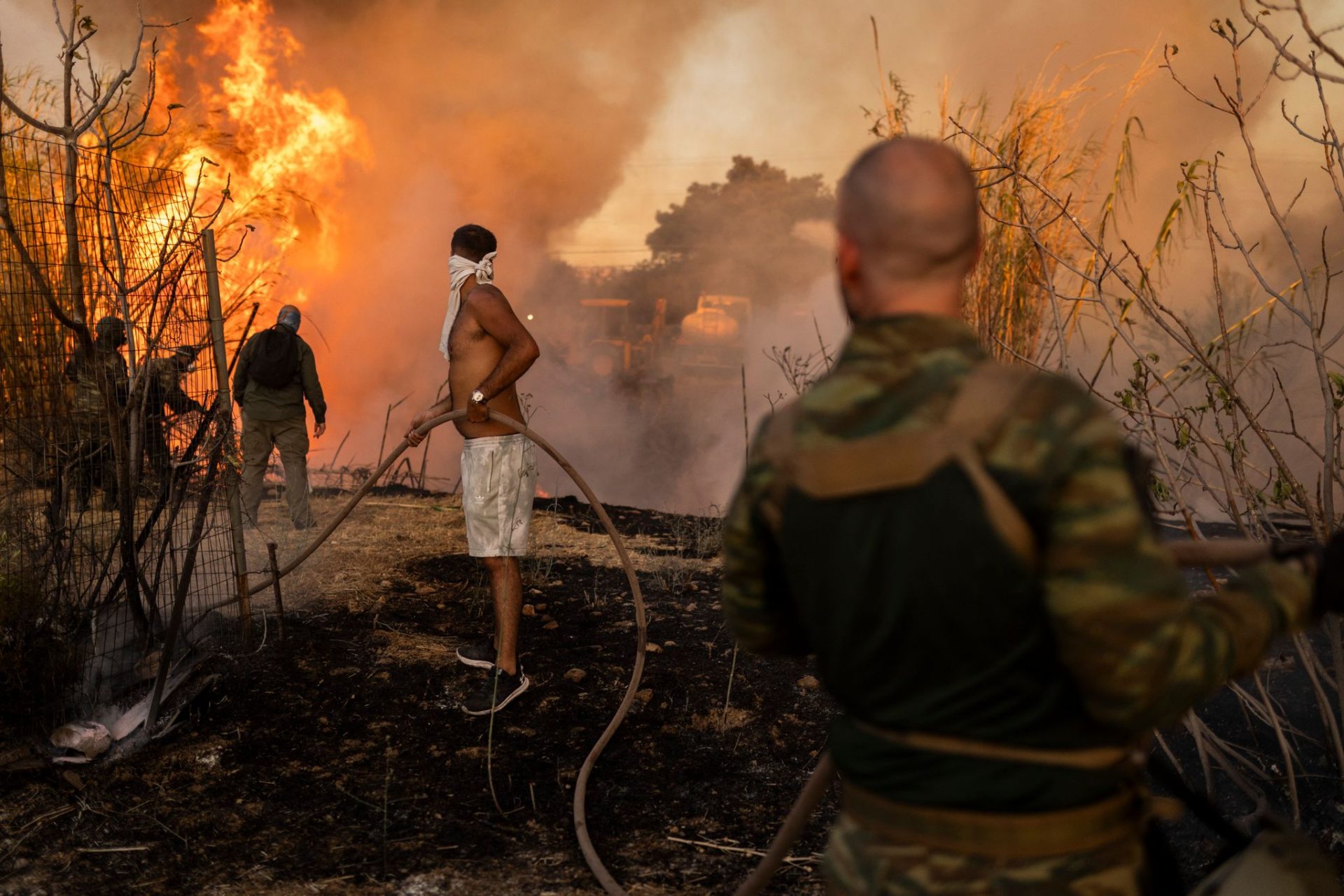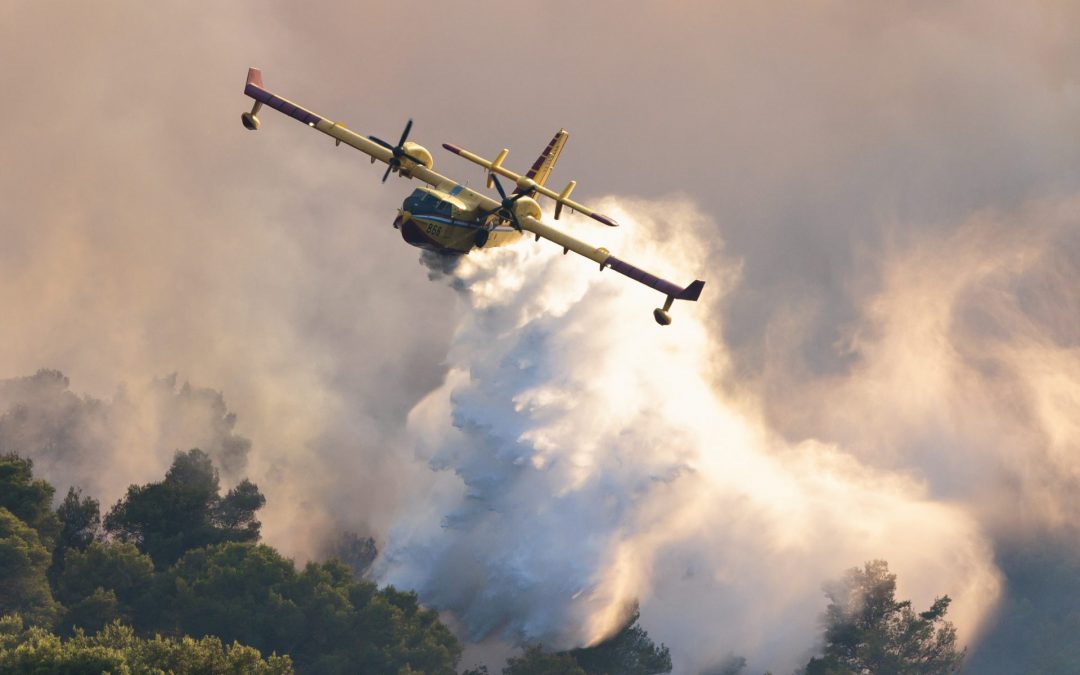 Have the article read by OpenAI (Beta). Please note that AI translations may take some time to process.
Have the article read by OpenAI (Beta). Please note that AI translations may take some time to process.As wildfires continue to affect multiple European countries, the European Union’s Emergency Response Coordination Centre (ERCC) is working 24/7 to channel assistance to help tackle the blazes, the European Commission said earlier in August.
Over the course of July and August, wildfires have been ravaging in several European countries, including Albania, Bosnia and Herzegovina, Bulgaria, Greece, North Macedonia and Portugal. In response, the EU has activated its Civil Protection Mechanism (EUCPM) for countries that need help from their partners to combat the devastating and deadly blazes.
To boost preparedness measures for this summer’s fire season, the Commission has set up the rescEU and European Civil Protection Pool with aerial capacities that now include 28 airplanes and four helicopters stationed in ten member states.
According to the European Commission, 556 firefighters from twelve countries are strategically prepositioned across key locations in Europe – in France, Greece, Portugal, and Spain – ready to help local fire brigades if forest fires break out.
What is the EU Civil Protection Mechanism?
The European Commission established the EUCPM in 2001. It aims to strengthen cooperation between participating countries on civil protection, to improve prevention, preparedness, and response to disasters.
Any country can request assistance via the EUCPM when struck by an emergency. The Commission plays a key role in coordinating the disaster response worldwide, contributing to at least 75 percent of the transport and/or operational costs of deployments.
In addition to all EU countries, Albania, Bosnia and Herzegovina, Iceland, Moldova, Montenegro, North Macedonia, Norway, Serbia, Türkiye, and Ukraine also participate, even though they are not (yet) members of the bloc.
Bosnia and Herzegovina, for example, officially joined the EUCPM in 2022 – a milestone for the country on the way to being granted EU candidate status that same year.

Fires near Athens: “EU solidarity in action”
Earlier in August, a massive wildfire in Athens’ northeastern suburbs forced thousands of residents to flee their homes and triggered a Greek government appeal for international help. According to experts, this was the first time that a major fire had come so close to the Greek capital.
In the wake of the fires, Greece formally called on the EU for assistance on August 12. Since then, several EU member states have been sending aid to the country. A European Commission spokesman said the support to Greece included two planes from Italy, two helicopters from France and Serbia, and ground firefighting crews from the Czech Republic, France, Italy, Romania and Serbia. Romanian, Maltese and Moldovan firefighters were already in Greece, the spokesman said.
Romania has deployed dozens of firefighters and special equipment to be ready to put out fires in Greece between August 1 and September 15. This is the fourth consecutive year that it has responded to such requests. Romanian firefighters have also carried out similar missions in previous years in France, Slovenia and North Macedonia.
Referring to the widespread support for Greece, European Commission President Ursula von der Leyen said in a post on X: “This is EU solidarity in action.”
EU mobilises further support across the continent
Over the summer, the EU has also mobilised support to help fight fires affecting Albania, Bosnia and Herzegovina, Bulgaria, North Macedonia and Portugal after they activated the disaster response mechanism.
Albania: Two Romanian planes arrived in Albania in August to help isolate and extinguish fires in some areas of the country. The Albanian Ministry of Defense announced that on August 14 and 16 the Romanian planes “Spartan” and “Hercules” intervened to extinguish fires in the cities of Pogradec and Berat.
Bosnia and Herzegovina: The Council of Ministers of BiH asked its neighbouring countries for help in extinguishing the fires that hit the country this year. Assistance was requested in the form of firefighting units and firefighting aircraft from countries with which BiH has signed agreements and memoranda on cooperation in protection and rescue through the EUCPM. The decision will be valid as long as the danger of fire continues during 2024.
Bulgaria: Bulgaria received dozens of aircraft, including airplanes and helicopters, to battle wildfires caused by a heatwave in mid-July. The Bulgarian government has expressed gratitude for the help and support provided under the EUCPM.
North Macedonia: In mid-July, planes from Croatia, Serbia, Slovenia, and Türkiye were being deployed in North Macedonia to help contain a string of blazes across the country amid a heatwave. Hundreds of hectares of forest had been burnt and authorities identified twelve active wildfires at the time.
Portugal: On Wednesday, the Portuguese government announced that it decided to activate the EUCPM to combat a fire that has been raging on the island of Madeira (an autonomous region of Portugal) since August 14. Data from the European Forest Fire Information System (EFFIS) showed more than 4,930 hectares of burnt area. With this decision, the way is open for Canadair planes to be sent from Spain, which had already announced its willingness to spare two aircraft. They arrived on the island on Thursday, August 22.
Floods in Slovenia and Italy in 2023
Slovenia learned about the importance of the EUCPM in the biggest fire in its history in the summer of 2022 and notably the catastrophic floods that affected two thirds of the country in August 2023. In the wake of the floods, the country received support from the mechanism in a variety of forms, from air support for firefighting in the Karst region along the border with Italy, to heavy construction equipment, helicopters and other flood relief.
In May 2023, the Emilia-Romagna region in northern Italy was also hit by devastating floods. Following the activation of the EUCPM, two high-capacity water pumping teams from Slovakia and Slovenia were sent to Ravenna. Further help had been offered by Austria, Belgium, Bulgaria, France, Germany, Poland and Romania.
More than firefighting: EUCPM provides in medical and humanitarian emergencies too
While the mechanism is most prominently triggered by natural disasters, assistance can also be requested for other emergencies, such as health crises and humanitarian disasters in conflict-ridden areas.
On July 24, the first EU-coordinated rescue of 16 Palestinian children and their family members, who were in need of medical attention, took place. They were brought from Egypt to Spain with financial and operational support from the EUCPM, in close coordination with the World Health Organization (WHO), the Palestine Children’s Relief Fund (PCRF) and the Palestinian authorities.
Since early January, the EU has also been supporting the WHO Gaza Emergency Medical Teams Coordination Cell in Cairo, with 22 experts deployed from the EU and EUCPM participating countries.
During the Covid-19 pandemic, the EU has coordinated the deployment of medical teams to the most affected areas, facilitated the procurement of additional protective equipment and activated the ERCC to coordinate support 24/7.
Furthermore, in the face of Russia’s war in Ukraine, the European Commission is coordinating a large operation under the EUCPM. The 27 EU countries (plus Iceland, North Macedonia, Norway, Serbia and Türkiye) have offered assistance ranging from medical supplies and shelter items to vehicles and energy equipment. The EU has also established logistics centres in Poland, Romania and Slovakia to channel goods to Ukraine more efficiently.
This article is published twice a week. The content is based on news by agencies participating in the enr.
